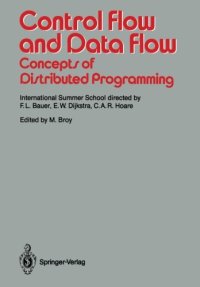
Ebook: Control Flow and Data Flow: Concepts of Distributed Programming: International Summer School
- Tags: Programming Techniques, Control Structures and Microprogramming, Processor Architectures
- Series: Springer Study Edition 14
- Year: 1985
- Publisher: Springer-Verlag Berlin Heidelberg
- City: Berlin ; Heidelberg [u.a.]
- Edition: 1
- Language: English
- djvu
In a time of multiprocessor machines, message switching networks and process control programming tasks, the foundations of programming distributed systems are among the central challenges for computing sci enti sts. The foundati ons of di stributed programming compri se all the fasci nating questions of computing science: the development of adequate com putational , conceptual and semantic model s for distributed systems, specification methods, verification techniques, transformation rules, the development of suitable representations by programming languages, evaluation and execution of programs describing distributed systems. Being the 7th in a series of ASI Summer Schools at Marktoberdorf, these lectures concentrated on distributed systems. Already during the previous Summer School s at Marktoberdorf aspects of di stributed systems were important periodical topics. The rising interest in distributed systems, their design and implementation led to a considerable amount of research in this area. This is impressively demonstrated by the broad spectrum of the topics of the papers in this vol ume, although they are far from being comprehensive for the work done in the area of distributed systems. Distributed systems are extraordinarily complex and allow many distinct viewpoints. Therefore the literature on distributed systems sometimes may look rather confusing to people not working in the field. Nevertheless there is no reason for resignation: the Summer School was able to show considerable convergence in ideas, approaches and concepts for distributed systems.
In a time of multiprocessor machines, message switching networks and process control programming tasks, the foundations of programming distributed systems are among the central challenges for computing sci enti sts. The foundati ons of di stributed programming compri se all the fasci nating questions of computing science: the development of adequate com putational , conceptual and semantic model s for distributed systems, specification methods, verification techniques, transformation rules, the development of suitable representations by programming languages, evaluation and execution of programs describing distributed systems. Being the 7th in a series of ASI Summer Schools at Marktoberdorf, these lectures concentrated on distributed systems. Already during the previous Summer School s at Marktoberdorf aspects of di stributed systems were important periodical topics. The rising interest in distributed systems, their design and implementation led to a considerable amount of research in this area. This is impressively demonstrated by the broad spectrum of the topics of the papers in this vol ume, although they are far from being comprehensive for the work done in the area of distributed systems. Distributed systems are extraordinarily complex and allow many distinct viewpoints. Therefore the literature on distributed systems sometimes may look rather confusing to people not working in the field. Nevertheless there is no reason for resignation: the Summer School was able to show considerable convergence in ideas, approaches and concepts for distributed systems